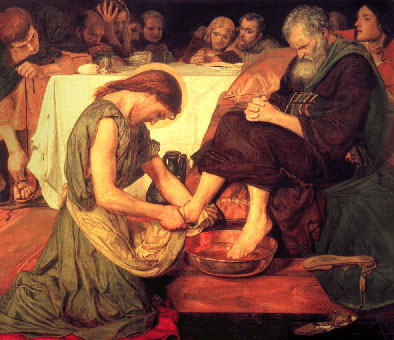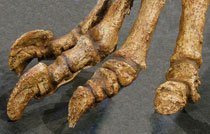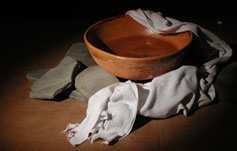
Reflection by Deborah Beach Giordano
It Simply Isn't Done
“Not my feet, Lord!”

Peter was appalled. Here was Jesus — the Lord! — clad in a plain woven shirt, a towel around his waist, down on his hands and knees washing his followers’ feet like a servant girl. Higher-ups did not serve their underlings, but were served by them; the elite lounged on soft cushions and rested on elegant couches, while the lowly bowed before them and knelt on the ground: that’s just how things were; that’s how you knew who was who.
What Jesus was doing was disturbing, disconcerting, distressing — intentionally. His behavior was meant to change the outlook and expectations of his followers. And it did. And Peter found it a distinctly uncomfortable experience.
And I know the feeling. Acutely.
This isn’t due to a belief in top-down management or nostalgia for times past — but to abject horror at the thought of exposing my feet to public gaze. That makes me very uncomfortable. I’m definitely not a fan of Maundy Thursday foot-washing rituals.
Vanity. All is vanity…
"Not my toes, Lord!”
 I could say that my resistance to baring my toes springs from a noble desire to protect the innocent or unwary, but the truth is I’m embarrassed by the looks of these gnarly little appendages. Years of high-heels and pointed-toe footwear have taken their toll, and the result isn’t pretty. I’d rather keep these bumps and bends and triangle-shaped toes hidden and out of sight, rather than reveal my flawed feet.
I could say that my resistance to baring my toes springs from a noble desire to protect the innocent or unwary, but the truth is I’m embarrassed by the looks of these gnarly little appendages. Years of high-heels and pointed-toe footwear have taken their toll, and the result isn’t pretty. I’d rather keep these bumps and bends and triangle-shaped toes hidden and out of sight, rather than reveal my flawed feet.
In that respect I am like Peter: worried about appearances; more concerned with how things look than in comprehending the message. It’s a common problem, I think. It is easy to be distracted by insignificant details and miss out on what’s important.
What We “Know”
The Lord told Peter that he would come to understand the event later and, when he rejoined them at the table explained it to the disciples. It was an embodiment of his Message: there was no greater or lesser within the community, no single best and brightest, no Christian “elite.” None was superior to another: each was to be a servant of all, ever-seeking to bless, to heal, to encourage, to help. Jesus’ followers would be known by their love for one another.
We are to comfort and care for one another even if it causes us to appear foolish or lose status in the eyes of our culture or community. What matters is that we love one another.
In some ways that is the easiest and simplest part of the message. Most Christians understand that we are called to be people of compassion: we are to care for others, to seek to bring health and healing and comfort to those in need. (This isn’t to say we always live into that truth — only that we are well-aware of it.) And there is more to the story; we will find it on the other side of the basin of water.
At the Water Basin
 In washing his disciples’ feet, Jesus was confirming and affirming our part in His Story — not only as doers of the word, but as hearers: as recipients of the Lord’s compassion and care. We are blessed and cherished children of God.
In washing his disciples’ feet, Jesus was confirming and affirming our part in His Story — not only as doers of the word, but as hearers: as recipients of the Lord’s compassion and care. We are blessed and cherished children of God.
Imagine the variety of feet that Jesus looked upon that day! Old and young, weak and strong, bent and bruised, scraped and scarred; aching, weary, dirty, dusty, smelly. And all of those who were there were held tenderly in Christ’s hands, cleansed, and blessed for the Journey. No one was excluded. All were washed.
We are blessed and cherished children of God; just as we are.
Remember!
The spectacle of Jesus kneeling at their feet was a lesson his disciples would never forget; due, in part, to the discomfort and embarrassment it evoked. We tend to recall — often long after the fact, in late-night reveries — those cringe-inducing moments when we have been caught short: confused, ill at ease, uncertain what to do; stumbling, bumbling, and generally looking foolish. (Why aren’t our successes as easy to remember?)
That’s precisely what Jesus tells Peter: “Later on you’ll understand what this is all about.” It will take time for the disciples to realize why Jesus washed their feet, and why he did it at that time: in the last few days before the crucifixion. He wanted it to be remembered and reflected upon, over and over again; he wanted to imprint on their memories this essential aspect of the Gospel: that we understand not only our part in the Work, but our place in God’s heart.
We are blessed and cherished children of God; just as we are.
We are blessed and cherished children of God; just as we are. Even — perhaps especially! — when we are confused, distressed, disappointed, dissatisfied. We are none of us perfect: only perfectly loved. When our focus is exclusively on our failings and flaws, we are blind to the presence of the One who loves us utterly, though He is right in front of us.
In His great compassion, Jesus washed the feet of all who were there, even Judas. Nothing can separate us from the love of God.
You are a blessed and cherished child of God; just as you are.May Christ’s grace and healing love abound,
Deborah ✝
Suggested Spiritual Exercise
Imagine that Jesus is washing your feet.